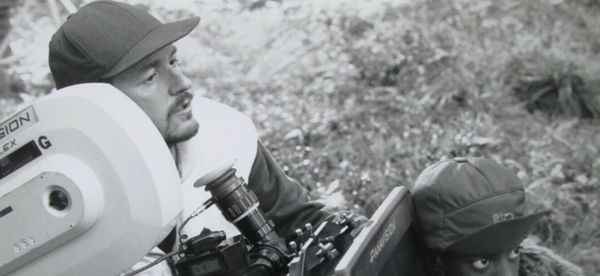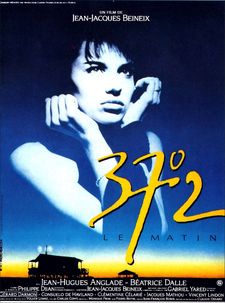 |
| On the set of IP5: The Island Of Pachyderms (1992) - Jean-Jacques Beineix whose death has been announced in Paris Photo: UniFrance |
Beineix reached a pinnacle with his first film, Diva, and then hurtled into a morass of critical bashing with his next, Moon In The Gutter. Jean-Jacques Beineix sports two films on Variety's list of best foreign films ever made (Diva and Betty Blue) yet endured long periods of absence from the big screen.
Beineix (pronounced baynex), who was born in Paris in 1946, had a turbulent career – to put it mildly. As of 1971 he began working in the cinema in various assistant director positions, and in 1977 co-wrote and directed a short (under 15 minutes) narrative film Monsieur Michel’s Dog (Le Chien de Monsieur Michel).
 |
| Betty Blue poster |
In 1983 Beineix co-wrote and directed The Moon In The Gutter (La Lune Dans Le caniveau), based on the 1953 novel of the same title by American pulp-fiction writer David Goodis, whose work has inspired a number of films.
With its over-the-top, studied artificiality The Moon In The Gutter was mercilessly savaged both by the critics when it premiered at the Cannes Film Festival, and this time there was no Toronto Film Festival to save it.
In 1986 Beneix clambered back on his artistic feet with Betty Blue (37°2 Le Matin), an adaptation of Philippe Djian’s novel. Although far from universally admired, the film was Oscar nominated in the Best Foreign Film category, and it has become the director’s second most popular work.
Following Betty Blue, however, Beineix became all but invisible outside of his native France. His next three narrative features— Roselyne and the Lions (Roselyne et les lions, 1989), IP5: The Island Of Pachyderms (IP5: L’île aux pachydermes, 1992), and Mortal Transfer have had almost no theatrical screenings anywhere else outside of France.
 |
| Jean-Jacques Beineix Photo: UniFrance |
Often he felt he has been misunderstood – and may be partly to blame himself. “It's probably going to be a big part of the book I'll write. So many things have been said but I have to understand who said it. Maybe on many occasions they are not the good people, but the bad people.
“Because you resist, because you're a maverick, because you're madly passionate for what you do, and probably whimsical, they think so. But not mad. I do my job very well and I'm extremely respectful of talent and of good people. But I am extremely tough with stupid people and I don't like bullshit. Also, I probably do have a big mouth and I say things. I say 'I don't make this film because it's really stupid.' I also want the final cut because I have produced my last three pictures. So if I don't get final cut, I say I don't make the picture with you. That's it.”
After completing five features Beneix decided to make four documentaries before returning to features with Mortal Transfer. He says he never wanted to stop filmmaking but that he suffered some kind of depression.
“When Yves Montand [who appeared in IP5] died they accused me of having killed him. It's true, it was in the news; it was big. Then my mother died. And then my press agent, who I really cared for and who was really a good friend, died the same year. It's like you've been punched and punched and punched. It built up and suddenly I couldn't make a picture.
“There was pressure, the need for a hit and I just couldn't do any more. I had doubts but in order to keep my need of creation, which was a way to cure myself, I went to documentaries. The feeling of bitterness and a lack of desire was replaced by the interests and passions of the people I was meeting in my documentaries.”
Beineix, who wrote a memoir in 2006, Les Chantiers de la Gloire (publisher Fayard), always remained hopeful the glory days would return. His brother Jean-Claude announced Beineix’s death in Paris on Thursday after a long illness. The news came as major figures from the industry gather in the city for the 24th Rendezvous with French Cinema. The organisers said the director was a significant ambassador for le cinéma français travelling extensively throughout the globe on promotional trips. They praised his original visual style which gave “a new breath of fresh air” to French films in a career that spanned two decades.





















